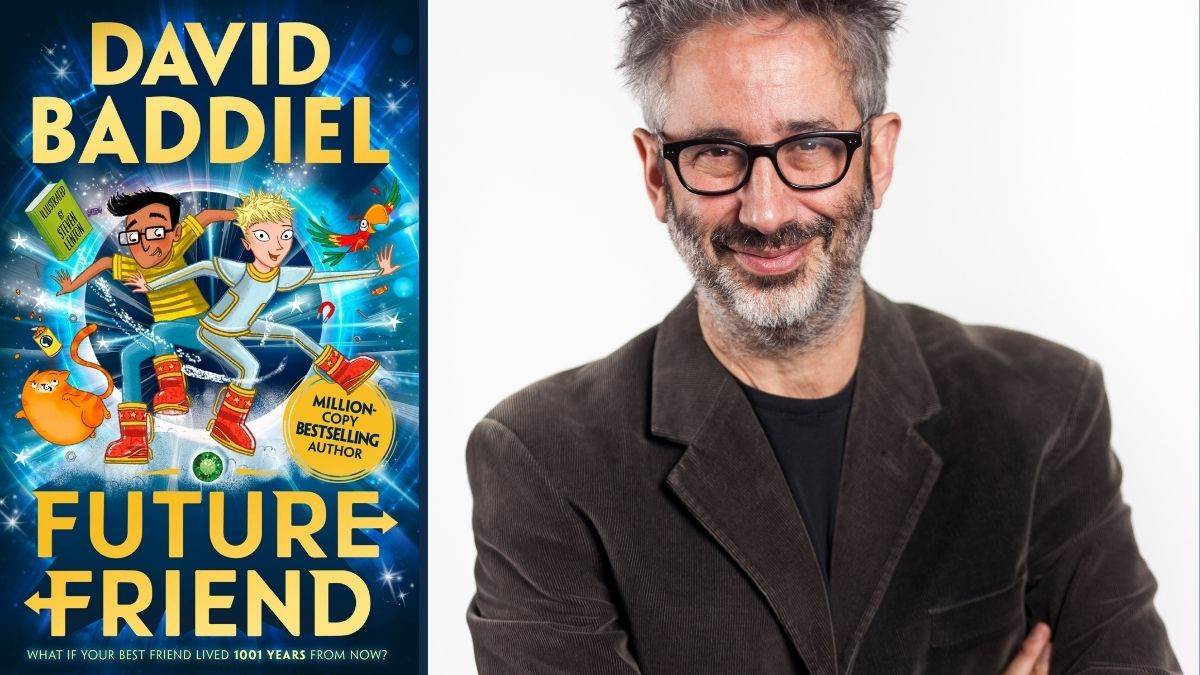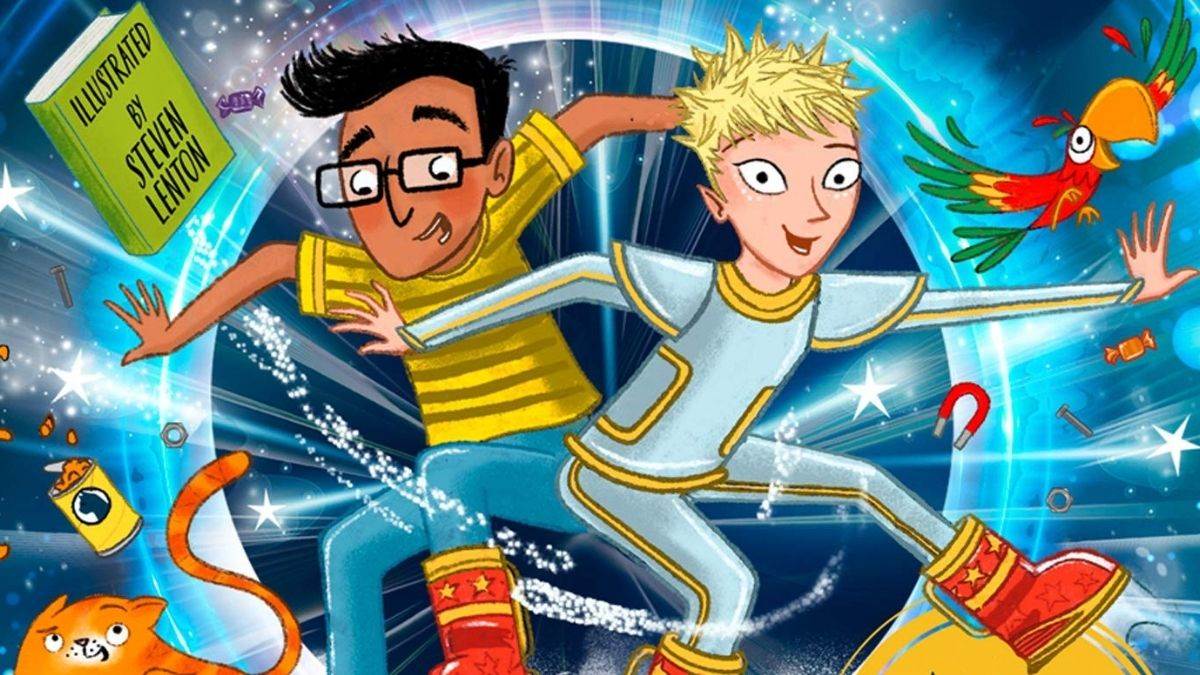Future Friend: how David Baddiel ended up writing about a future where nobody can go outdoors...
Published on: 8 Rhagfyr 2020
David Baddiel's new book, Future Friend, is set in a time when people can't go outside - sound familiar? He tells us how he accidentally ended up writing about a pandemic, and how books can help transport us to another world...

Tell us a bit about your new book Future Friend!
It’s about an 11-year-old girl called Pip who lives in the year 3020, a thousand years from now. I started writing it right at the start of this year, before the pandemic hit us in Europe. The way that I’d imagined 3020 was everyone living in very big towers and because of things that had happened by 3020, including climate change but also mutant viruses, no one goes outside. Pip has to stay in her ‘house unit’ with her parents and her talking cat and talking parrot (animals have evolved to speak) and her robo clone Pip 2. She gets taught her lessons by hologram. Her parents are scientists and there's a house lab where she’s not allowed to go.
But of course, when there's an explosion in the lab, she can't help herself. She goes in there and finds a time portal which brings her back to 2019 (I changed it to from 2020 to 2019, because it’s not that exciting for a girl that comes back from 3020 who can’t go outside to be transported back to another lockdown!) And Pip has to make her way back to 3020 for reasons you’ll discover when you read the book.
Can you tell us how it felt when we went into lockdown and you found you’d kind of predicted the future and written a dystopian middle grade novel?
First of all I panicked! Well, everyone panicked, but from a writer's point of view because I did think: "this is going to mess up the central premise of my book." And then on a larger scale I thought, this is now going to be an issue for writing in general about our time. Will everything we write from now on be about this or set before it starts?
I’m not sure people believed I’d written most of it in January. I thought I'd predicted the future in not a very helpful way!
It turned out for the best in this book because I hope it will help children who are going through this to process it, and without giving too much away, because the book has a happy ending, maybe to think of there being a way out of it. The publishers did ask if I wanted to take out references to viruses and I said, no. It’s close to home but it will help children deal with it.
Was it difficult to get the balance right between being a great story to read and being too scary for the age group?
Yes. I don’t write my books knowing the ending. I thought, I don’t know how to make this right. And it felt more pressing to make it right because of what’s going on in the world. Rahul and Pip have to sort this out or the children reading this book are going to think this is what the world’s going to be like forever, and that IS depressing. So I worked through it but I didn’t know what it was until I reached the end of the book. So that was a relief to me and hopefully it will be to the readers.
How do you write your books?
I used to carry a notebook around now it’s mainly my phone. I rely on my instinct for the idea. It's the same for adult's books, but in children’s books that’s particularly important as they're very story driven. Even though I start writing not knowing what’s going to happen, if the idea has legs it will drive me through the story and the shape will emerge. It’s quite an organic way of writing. I know other authors have it all mapped out, and other people don’t plan anything at all. I’m sort of halfway between the two. I’ll have the idea, I’ll start writing, then I’ll often stop about a third of the way in and think okay, I think I know where this is going now, but now I have to go back and change a bit of the start to make the ending that’s emerged make sense.
What makes your idea turn into a children’s book?
I know if the idea is for children and that’s mainly to do with story. All my children’s ideas are big, broad, high-concept stories.
A world in which children choose their own parents, a video game controller that allows you to control people, a boy who wishes for his birthday to be every day which then comes true. These are magical wish fulfilment stories.
When I first started writing my children’s books, I didn’t dial down the comedy at all. Obviously there are some things I wouldn’t go into and words I wouldn’t use, but I’d try to be as funny as I would be normally - because I have a very deep belief that children are much, much funnier than they used to be. When I was a kid there wasn’t a lot of comedy for children. I don’t think I was at all funny until I was about 13. But my son was hilarious when he was 7, and there’s a really obvious reason for that: he’d watched every episode of The Simpsons by that point! So when I was writing kids' books I didn’t want to tone anything down. There’s irony, sarcasm, at all sorts of stuff - and even some jokes for adults in it!

How did you start writing children’s books?
I really started writing children’s books when my then 8-year-old son asked me, why doesn’t Harry Potter run away from the Dursley’s and try and find some better parents? It gave me the idea for a world where children can choose their own parents. I thought at the time: that is a good idea for a children’s book.
I don’t recognise barriers between different types of storytelling.
There’s always been a bit of snobbery in the literary world about comedians writing stories. I’ve always thought that’s ridiculous because comedians are storytellers. They are no longer blokes in bow ties who tell jokes. They write their own material, and much of that is story led. And so if you’re a writer saying stuff out loud on stage, you can do it in a book.
Future Friend has quite a lot about climate change and the world being precarious. There’s a lot about the fragility of friendship. I try to make my books quite moving, and adults find them moving, but I think what children find moving is different. In Toy Story 3 there’s a bit where Andy gives his toys away because he’s too old for them - I couldn’t watch it without being reduced to liquid form. But I watched it with my daughter who at the time was 9, and she said "why are you crying dad? It’s a nice thing." She didn't understand about the loss of innocence. There’s a bit at the end of Future Friend that I find really moving... but I don’t know whether a child would find it moving or not!
What were the books you loved to read as a child?
When I was younger I read all the books you might expect: Roald Dahl, Richmal Crompton’s Just William books and Enid Blyton. My mum used to collect old books and slightly forced me to read the Billy Bunter books, and I’m not THAT old - these books are from the 20s and 30s!
When I was a young teenager I read books by Isaac Asimov and Philip K Dick. This book is without a doubt inspired by the film E.T. the Extra Terrestrial. It was a huge experience for me because I was about 17 when I saw it. I was quite cold and snobby about films at the time. I just liked art films and I was a bit of a pretentious teenager and then I went to see E.T. thinking I’d hate it, and cried and cried and cried. And I realised this is what I like: films that are emotional and telling – that deliberately manipulate your emotions in an amazing way. And this book is about someone who comes from a different place and is a bit strange and alien, but finds a friend and has to be kept safe from adults.
Why do you think children should read books?
Reading is an extraordinary thing and allows for the growth of the imagination.
I have to say I think reading is under threat and sometimes in a complicated way. My son doesn’t read very much and I feel very sad about that. As a writer and someone who loves books, I wish he would read more. However, I cannot put my hand on my heart and say my son isn’t extremely witty and articulate, and that’s because he’s watched television which I couldn’t do when I was young. You don't have to be a reader to be a really imaginative storyteller. But I still think a book has the ability to place you in another world. I meet children as a result of my career who are transported by what I write and what other people write - and that’s a beautiful thing. And of course, reading can help keep us going through the pandemic. Books have provided solace for kids and adults alike who are stuck at home.
Future Friend by David Baddiel is published by HarperCollins.
Topics:





